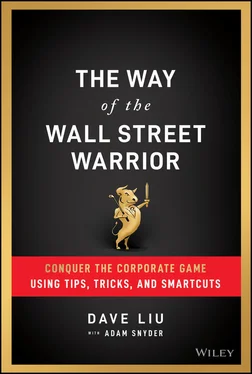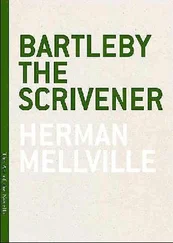How many balloons can you fit in a truck?This is a real question, and equally inane queries are the favorites of highly paid interviewers, maybe because they're bored out of their minds asking dead-end questions like “What are your goals?” and “What do you perceive as your strengths and weaknesses?” Or maybe because they really think they might learn something about the candidate by their reaction. There are a bazillion variations of this sucker. How many squirrels would be needed to blanket the Moon? How many golf balls could you stuff in your colon? You get the idea. Each question is more absurd than the one that preceded it.Lest you think I'm making this up, ask around. These are actual questions asked at top investment banking and management consulting firms like Goldman and McKinsey. Why, you ask? Because they want to see how you think “out of the box,” as they say. I know; it's stupid, but make sure you walk through the methodology in a coherent manner. Obviously, no one has any idea what the real answers are; they're just interested in how you think under pressure. The only right answer is to play along, but at the same time show you can think out loud logically. Ask clarifying questions. Remember that a big problem is just a bunch of small ones, so break them down and solve them one by one.Take a lesson from Spencer Wang, a former banker at Credit Suisse and Salomon Brothers, who retired as the chief investment officer of Seasons Capital. When hiring, Spencer always asked candidates his own version of the balloon question. “I'm going to flip a coin 10 times,” he'd tell them, “but first I'm going to give you $1 million of my money to bet on a coin flip. What's your bet on the first flip? What will be your bet on the 11th flip? Now what if it's your $1 million, does that change your answers?”Spencer knew these questions were atypical. Many would say it's a 50/50 proposition so it shouldn't matter what they bet. Spencer's take was that while these interviewees were book smart, there was nothing innovative in their answers. He generally rejected people who jumped at an answer without asking questions. One person Spencer did hire was a candidate who, once he learned he could ask questions, fired them off: “Is this a two-headed coin? Is it equally weight distributed? When could he stop and take his winnings?” Spencer hired him. Why? Because this person demonstrated intellectual curiosity, took charge of the situation, and turned it into one most in his favor. Spencer recently told me he still believes in this fellow, and that he invested in his fund, which has vastly outperformed the market during its lifetime.I have some experience myself with these “moonball” questions. One of my interviews out of Wharton was at a top management consulting firm, where I was asked by a smug interviewer the “Squirrels on the Moon” question. I actually knew how many squirrels could blanket the moon and told him. As we were about to wrap up, he asked me if I had any questions. I was young and had already decided I didn't want to count crap in the ocean for a living. So I asked him, “How many tires can you fit in the Pacific Ocean?” He nervously laughed off my question and bid me farewell.
Pitch yourself.This is another common ask, and a favorite of mine, particularly for more senior positions because I'm trying to gauge how people sell themselves. Some just panic, while others pitch themselves like a hot Internet stock. Personally, I go aggressive and pitch myself as the second coming of Amazon at IPO. Sometimes this strategy can backfire if you sell too hard, but at least it will get a few chuckles.A variation, albeit less aggressive, is “Tell me about yourself.” This is a favorite of Bret Pearlman, co-founder of Elevation Partners and former senior managing director at Blackstone. He says it gives him insight into what a person thinks is important to know about themselves and gives him an opportunity to gauge potential fit. Of course, many a fool has answered this question by going on too long, repeating their resume, being a bore, or unveiling something about themselves that should have been kept secret. If you do get this one, remember that form is more important than substance. You've already made it this far because you have the quals. Now it's time to show them you have the energy and gusto. That's how you'll win the audition.Lauren Wu, former equity analyst and CFO of venture capital at J&W Seligman and Merrill Lynch banker, says it's important to be proud of your accomplishments and make it clear you deserve the job. She adds that women tend to say “We” when talking about accomplishments, while men tend to say “I.” She suggests that women candidates say “I” more often.Alexandra Lebenthal, senior advisor at Houlihan Lokey and former CEO of Lebenthal Holdings, adds that women can be their own worst enemy. “I think in many cases, we can have a tendency to feel like we aren't qualified. People joke that if there are four qualifications for a new job, a woman will think she needs six while a man will feel like he is in good shape with two. We cannot be afraid to take on new challenges; women shouldn't back down from pursuing their passions.”
Tell me something no one knows about you.OK, this can be really dangerous, so be prepared for variations of this question, like “Tell me something that isn't on your resume” or “If I Googled you, what would be on the back pages?” Here are some suggested answers that should keep you in the game:Volunteer something you think your interviewer and you may have in common, perhaps a hobby not on your resume or an interest that seems geeky but makes you appear multidimensional. For me, it was always about being a cartoonist—the Chinese Stan Lee!Another good option is to talk about an aspect of yourself that isn't on your resume or cover letter but will make you even better suited for the job. For me, it was my skills in COBOL, an archaic programming language designed in the 1950s. Jefferies was actually using a COBOL mainframe system for doing securitizations and I fit the bill of being a perfect grunt to take it over.
One important reminder concerning these commonly asked questions:
DON'T BE BORING! Put yourself in the shoes of your interviewer, who has spent all day listening to people just like you drone on and on about their achievements, why they want the job, what makes them great, blah, blah, blah. After a half-dozen of these, any sane person thinks about jumping out the nearest window. So be entertaining. Use what you've learned from the zeitgeist and from collecting dirt on your interviewer's interests. Take the conversation wherever they want but be prepared to gossip about other topics. Try to be a Renaissance person, equally adept at discoursing about FDR, the FDIC, or Jay-Z.
Over the years, I've forgotten the details of almost every interview. However, one I remember vividly had nothing to do with the job for which we were hiring. We were both from Texas, and once this candidate found out I was a Houston Rockets fan, we spent half the interview talking about how bringing Clyde “The Glide” Drexler to Houston mid-season in 1995 was the greatest trade in NBA history. Finding a Rockets fan in L.A. surrounded by Laker bandwagoners was like finding a hundred-dollar bill stuck to the bottom of my shoe. It made my day.
Finally, when interviewing, beware of the hot-cold empathy gap, which states that we act differently when in different psychological states. Hot cognition , initially proposed in the 1960s by Yale University psychologist Robert P. Abelson, is the theory that a person's thinking is influenced by their emotional state. It contrasts with cold cognition , in which the processing of information is motivated by facts and intellectual judgment, independent of emotional involvement. Since hot cognition is led by emotion and often leads to rapid, automatic decision-making, it may cause biased and low-quality conclusions. (It's why you should never, ever make financial decisions while getting busy with your significant other. You're liable to break the bank.) So during the interview process, make sure you're cool, calm, and collected when an assignment is suddenly sprung on you.
Читать дальше












